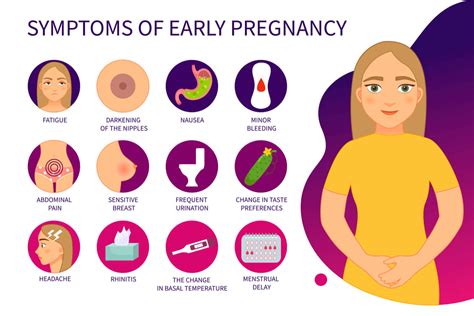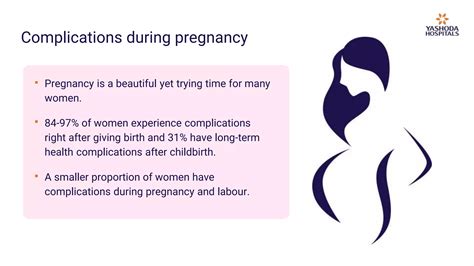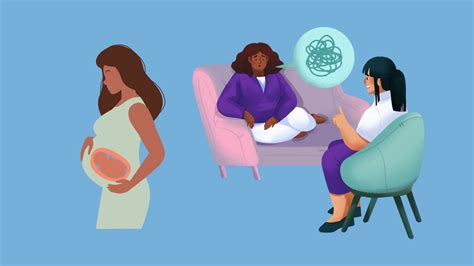Intro
Discover early Am I Pregnant Signs like morning sickness, missed periods, and fatigue. Learn pregnancy symptoms, causes, and detection methods to confirm pregnancy.
The uncertainty and excitement of wondering if you're pregnant can be overwhelming. For many women, the earliest signs of pregnancy can be subtle and easily mistaken for other conditions. However, being aware of the common symptoms and changes that occur during early pregnancy can help you identify whether you might be expecting. If you're trying to conceive or think you might be pregnant, it's essential to recognize the signs and take a pregnancy test to confirm.
Pregnancy is a unique experience for every woman, and the symptoms can vary greatly from one person to another. Some women may experience severe morning sickness, while others may not feel any symptoms at all. Additionally, some symptoms can be similar to those experienced during pre-menstrual syndrome (PMS), making it challenging to determine whether you're pregnant or just about to start your period. Despite these variations, there are common signs and symptoms that many women experience during early pregnancy.
The journey to motherhood begins with a single cell, and the early stages of pregnancy are crucial for the development of the fetus. As the embryo implants itself into the uterine lining, hormonal changes occur, leading to various physical and emotional symptoms. These symptoms can be mild or severe and may include breast tenderness, fatigue, mood swings, and food cravings. Understanding these symptoms and how they relate to pregnancy can help you better navigate this life-changing experience.
Early Signs of Pregnancy

The early signs of pregnancy can be divided into physical and emotional symptoms. Physical symptoms include breast tenderness, nausea, vomiting, and fatigue, while emotional symptoms include mood swings, irritability, and anxiety. These symptoms can be mild or severe and may vary from one woman to another. Some women may experience all of these symptoms, while others may only experience a few.
Physical Symptoms
Physical symptoms are often the most noticeable signs of pregnancy. These symptoms can be uncomfortable and may interfere with daily activities. Some common physical symptoms of pregnancy include: * Breast tenderness: Hormonal changes can cause breast tenderness, swelling, and darkening of the nipples. * Nausea and vomiting: Morning sickness is a common symptom of pregnancy, although it can occur at any time of day. * Fatigue: The physical and emotional demands of pregnancy can cause fatigue, which can be severe in some cases. * Frequent urination: As the uterus expands, it can put pressure on the bladder, leading to frequent urination. * Food cravings: Some women experience strong cravings for specific foods during pregnancy, while others may develop aversions to certain foods.Pregnancy Symptoms Week by Week

Pregnancy symptoms can vary from week to week. Understanding these changes can help you better navigate your pregnancy journey. Here's a breakdown of common symptoms experienced during each week of pregnancy:
- Week 1-2: Implantation bleeding, cramping, and mood swings
- Week 3-4: Breast tenderness, nausea, and fatigue
- Week 5-6: Food cravings, frequent urination, and morning sickness
- Week 7-8: Emotional symptoms, such as anxiety and irritability, become more pronounced
- Week 9-12: Physical symptoms, such as breast tenderness and nausea, may subside, while emotional symptoms continue
Emotional Symptoms
Emotional symptoms are common during pregnancy and can be just as challenging as physical symptoms. These symptoms can be caused by hormonal changes, stress, and anxiety about the pregnancy. Some common emotional symptoms of pregnancy include: * Mood swings: Hormonal changes can cause rapid mood swings, leading to feelings of irritability, anxiety, and depression. * Anxiety: The uncertainty and responsibility of pregnancy can cause anxiety and stress. * Depression: Some women may experience depression during pregnancy, which can be caused by hormonal changes, stress, and anxiety.Confirming Pregnancy

If you suspect you're pregnant, it's essential to confirm the pregnancy with a pregnancy test. Home pregnancy tests (HPTs) are available over-the-counter and can detect the presence of human chorionic gonadotropin (hCG) in urine. hCG is a hormone produced by the placenta during pregnancy. HPTs are generally accurate, but false negatives can occur if the test is taken too early or if the urine is too diluted.
Pregnancy Test Types
There are several types of pregnancy tests available, including: * Home pregnancy tests (HPTs): These tests detect the presence of hCG in urine and are available over-the-counter. * Blood tests: These tests detect the presence of hCG in blood and are generally more accurate than HPTs. * Ultrasound: This test uses high-frequency sound waves to create images of the fetus and can confirm pregnancy.Pregnancy Care and Precautions

Once pregnancy is confirmed, it's essential to take precautions to ensure a healthy pregnancy. This includes:
- Prenatal care: Regular prenatal check-ups can help monitor the health of the mother and fetus.
- Nutrition: A balanced diet rich in essential nutrients, such as folic acid, iron, and calcium, can support fetal development.
- Exercise: Gentle exercise, such as walking or swimming, can help maintain physical and mental health during pregnancy.
- Avoiding harmful substances: Avoiding substances like tobacco, alcohol, and certain medications can reduce the risk of complications during pregnancy.
Prenatal Care
Prenatal care is essential for a healthy pregnancy. Regular check-ups can help monitor the health of the mother and fetus, detect any potential complications, and provide guidance on nutrition, exercise, and other aspects of pregnancy care. Some common prenatal tests include: * Ultrasound: This test uses high-frequency sound waves to create images of the fetus and can detect any potential complications. * Blood tests: These tests can detect the presence of certain infections, such as gestational diabetes, and monitor the health of the mother and fetus. * Urine tests: These tests can detect the presence of certain substances, such as protein or blood, in the urine and monitor the health of the mother and fetus.Common Pregnancy Complications

While most pregnancies are uncomplicated, some women may experience certain complications. These complications can be caused by various factors, including pre-existing medical conditions, lifestyle factors, and genetic predisposition. Some common pregnancy complications include:
- Gestational diabetes: This condition occurs when the body is unable to regulate blood sugar levels during pregnancy.
- Hypertension: High blood pressure can occur during pregnancy and increase the risk of complications.
- Preeclampsia: This condition occurs when high blood pressure is accompanied by damage to organs, such as the kidneys or liver.
Pregnancy Complication Prevention
While some pregnancy complications cannot be prevented, there are steps that can be taken to reduce the risk. These include: * Maintaining a healthy weight: Excess weight can increase the risk of complications, such as gestational diabetes and hypertension. * Engaging in regular exercise: Gentle exercise, such as walking or swimming, can help maintain physical and mental health during pregnancy. * Avoiding harmful substances: Avoiding substances like tobacco, alcohol, and certain medications can reduce the risk of complications during pregnancy.Pregnancy and Mental Health

Pregnancy can be a challenging and emotional experience, and mental health is an essential aspect of pregnancy care. Some women may experience anxiety, depression, or other mental health conditions during pregnancy. These conditions can be caused by hormonal changes, stress, and anxiety about the pregnancy. It's essential to seek support from healthcare providers, family, and friends to manage mental health during pregnancy.
Mental Health Support
Mental health support is crucial during pregnancy. This can include: * Counseling: Individual or group counseling can help women manage anxiety, depression, and other mental health conditions. * Support groups: Joining a support group can provide a sense of community and connection with other women who are experiencing similar challenges. * Self-care: Engaging in self-care activities, such as meditation, yoga, or reading, can help reduce stress and promote mental well-being.Preparing for Motherhood

Preparing for motherhood can be an exciting and overwhelming experience. It's essential to take the time to prepare physically, emotionally, and financially for the arrival of the baby. This can include:
- Taking prenatal classes: Prenatal classes can provide education and support on topics like childbirth, breastfeeding, and parenting.
- Building a support network: Building a support network of family, friends, and healthcare providers can provide emotional and practical support during the postpartum period.
- Creating a birth plan: Creating a birth plan can help women feel more in control and prepared for the birth experience.
Postpartum Care
Postpartum care is essential for the health and well-being of the mother and baby. This can include: * Follow-up appointments: Follow-up appointments with healthcare providers can help monitor the health of the mother and baby. * Breastfeeding support: Breastfeeding support can help women establish a successful breastfeeding routine. * Emotional support: Emotional support from family, friends, and healthcare providers can help women manage the emotional challenges of the postpartum period.What are the earliest signs of pregnancy?
+The earliest signs of pregnancy can include breast tenderness, nausea, vomiting, and fatigue. However, these symptoms can be mild or severe and may vary from one woman to another.
How can I confirm pregnancy?
+Pregnancy can be confirmed with a pregnancy test, which detects the presence of human chorionic gonadotropin (hCG) in urine or blood. Home pregnancy tests (HPTs) are available over-the-counter, while blood tests and ultrasound can be performed by healthcare providers.
What are some common pregnancy complications?
+Common pregnancy complications can include gestational diabetes, hypertension, and preeclampsia. These complications can be caused by various factors, including pre-existing medical conditions, lifestyle factors, and genetic predisposition.
How can I prepare for motherhood?
+Preparing for motherhood can include taking prenatal classes, building a support network, and creating a birth plan. It's also essential to prepare physically, emotionally, and financially for the arrival of the baby.
What is postpartum care?
+Postpartum care is essential for the health and well-being of the mother and baby. This can include follow-up appointments with healthcare providers, breastfeeding support, and emotional support from family, friends, and healthcare providers.
As you navigate the journey of pregnancy, it's essential to stay informed and supported. Whether you're trying to conceive or have already confirmed your pregnancy, understanding the signs, symptoms, and complications of pregnancy can help you make informed decisions about your care. Remember to stay positive, focused, and prepared for the arrival of your baby. If you have any questions or concerns, don't hesitate to reach out to your healthcare provider or a trusted resource. Share your thoughts, experiences, and questions in the comments below, and let's support each other on this incredible journey.
